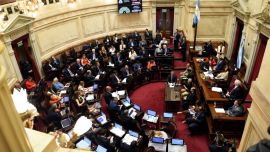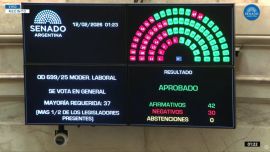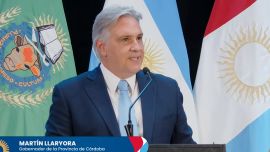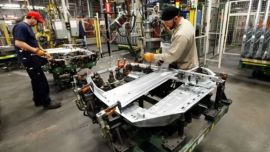Will President Mauricio Macri’s government last until the October 27 elections? Will he make it to the hypothetical moment in which he needs to pass over the presidential sash to Alberto Fernández? Are his restrictive economic measures, aimed at containing a runaway peso-dollar exchange rate, enough to keep Argentina from exploding? Is his political capital so consumed that both people and market find it impossible to believe, therefore eliminating any possibility that confidence will be restored? And, is it truly impossible for Macri to stage a comeback, Rocky-style, and clinch another four years in office? Videos have circulated in WhatsApp groups among his faithful with clips of the famous “Rumble in the Jungle” boxing bout in 1974, where Mohammed Ali knocked out George Forman in the eighth round after receiving a beating in Zaire, in one of the most incredible sporting comebacks ever.
Regardless of what happens in the actual election – and in a country like Argentina we already know that anything can happen – the situation is so dire that it forces one to ask these questions. Some have argued that Macri should “be a patriot” and either step down from his candidacy, setting up Roberto Lavagna (who could potentially beat the ‘FernándezFernández’ ticket in a run-off), or call for early elections and a quick transition of power. Macri’s defeat appears all but written, yet it is imperative for him to put up a fight if his political space, rebranded Juntos por el Cambio (“Together for Change”), is to play the role of democratic opposition in Congress, and from the City of Buenos Aires with Mayor Horacio Rodríguez Larreta’s expected re-election, starting in 2020.
Everyone and their mother have agreed that Argentina needs a socio-political-economic pact among the major players in each sector of society, in order to push through a series of tough and unpopular reforms, while stimulating the export sector to generate dollars and therefore jumpstarting economic activity. The Vaca Muerta basin is the key to positioning Argentina as a global player in natural gas, while the agricultural sector will continue to produce much-needed hard currency. Taming the fiscal deficit – which in turn requires doing something painful to pensioners and retirees, whose income make up two-thirds of the annual budget, while boosting unproductive PYMEs (small and medium-sized businesses which generate some 80 percent of formal employment in the country) – is necessary to eventually jumpstart consumption, the cornerstone of Argentina’s economy.
How do you do that, though, when the country is imploding? Macri’s plan clearly failed. Ahead of the PASO primaries he once again bet on the trust he thought he had generated among the investing community, hoping that by generating a healthy ecosystem for financial flows and a predictable continuity of pro-market policies, he would tame capital flight and negative pressure on the peso. If indeed he had done this, he would’ve pushed inflation below 2.5 percent on a monthly basis, which by econometric correlation causes economic activity to flourish.
Instead, unemployment has reached its highest levels in 13 years, at 10.6 percent in the second quarter, according to the INDEC national statistics bureau, while the country finds itself under a mountain of debt, the vast majority of it dollar-denominated. The peso has devalued aggressively throughout Macri’s presidency and inflation remains the sixth-highest in the world, according to a recent estimate by the International Monetary Fund that was released before the PASO primaries, just behind Venezuela, Sudan, Zimbabwe, South Sudan, and Iran.
There are a few things, though, where Macri has contributed, at the expense of us Argentines, in leaving things better than when he got to the Casa Rosada. According to Juan Luis Bour, the chief economist for FIEL foundation, the competitiveness of the Argentine peso is some two-thirds higher than in November 2015, the Central Bank’s foreign exchange reserves remain higher (despite their depletion), and the primary deficit was on track to its first surplus since at least 2011, until the PASO primaries, of course. The chief economist for Argentina, for one of the most important global banks, recently explained that fiscal and external accounts are adjusting quickly, while the ‘ajuste’ or necessary austerity and belt-tightening has already occurred, thanks to the “liquefying” of salaries due to inflation. The short-term debt situation is tough, while the debt structure for the upcoming years is complex, yet manageable if the “reprofiling” sought by Finance Minister Hernán Lacunza is successful (or, if Alberto Fernández’s economic team achieves it).
In other words, the situation is bad, but it presents an opportunity in the relatively short-to-medium term. Current volatility is probably more closely tied to the uncertainty regarding Alberto’s probable government, particularly given the presence of Cristina Fernández de Kirchner in the power structure. While Alberto has tried to indicate he will be a moderate Peronist with a marketleaning economic cabinet, he has also illustrated his deep contradictions. Like a true Peronist, he is playing everyone’s tune. Yet, it is unclear how much leeway he will have from an economic perspective, given the fact that there’s very little money left in the state’s coffers, money printing could lead to very high (even hyper-) inflation, and the fact that the IMF is the major creditor.
Thus, once again, it becomes clear that economics is a consequence of politics, and not the other way around. While the
structural issues are empirical, an agreement among several
sectors could generate stability. Whether Macri and the Fernándezes can figure that one out remains to be seen, but it remains
unlikely.related news





















Comments